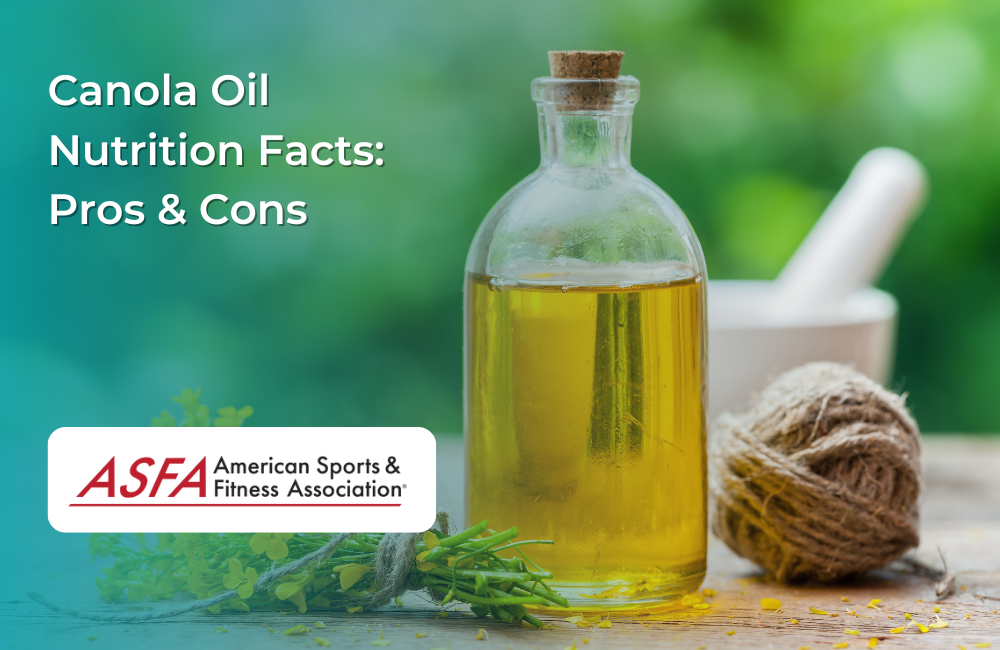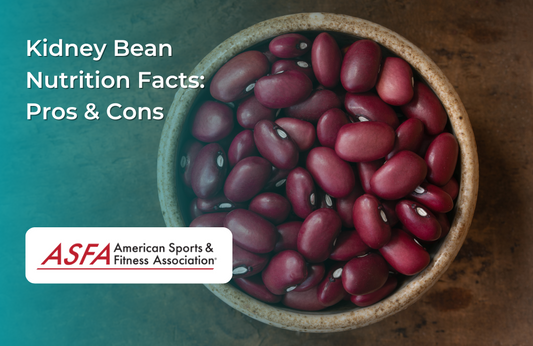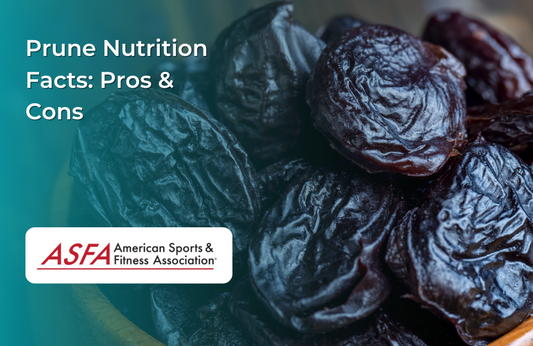Canola oil is a widely used cooking oil known for its neutral flavor and high smoke point. It is often considered a heart-healthy option due to its low saturated fat content and beneficial omega-3 fatty acids. However, concerns about its processing methods and omega-6 content should be considered.
Canola Oil Nutrition Facts, Pros and Cons (Per One Tablespoon)
-
Calories: 124
-
Protein: 0g
-
Carbohydrates: 0g
-
Fat: 14g
-
Monounsaturated Fat: 9g
-
Polyunsaturated Fat: 4g
-
Saturated Fat: 1g
-
Omega-3 Fatty Acids: 1.2g
-
Omega-6 Fatty Acids: 2.5g
-
Vitamin E: 2mg (10% of Daily Value)
The nutrition facts canola oil provides show that it is rich in beneficial nutrients, including monounsaturated and polyunsaturated fats, vitamins E and K.
Definition and Origin of Canola Oil
Canola oil is a versatile vegetable oil derived from the seeds of the canola plant, a specially bred variety of the rapeseed plant. The name “canola” is a blend of “Canada” and “ola,” signifying oil, as the plant was developed in Canada. Known for its neutral flavor and high smoke point, canola oil is a popular choice in kitchens around the world. Its affordability and adaptability make it a staple in cooking, baking, and food production, allowing it to seamlessly blend into a variety of dishes without overpowering other flavors.
Pros of Canola Oil
Low in Saturated Fat
-
Contains only 7% saturated fat, which is lower than many other oils like coconut or palm oil
-
Can help support heart health when used in moderation
-
The low saturated fat content can also reduce the risk of heart disease
Rich in Heart-Healthy Monounsaturated Fats
-
High in oleic acid, an unsaturated fat that helps regulate cholesterol levels and reduce inflammation
-
Can replace less healthy fats in cooking and baking
Contains Omega-3 Fatty Acids
-
Provides alpha-linolenic acid (ALA), a plant-based omega-3 that supports brain and heart health
-
A better omega-3 source compared to many vegetable oils. Additionally, canola oil contains linoleic acid, an omega-6 fatty acid that, despite some concerns, has been shown to support cardiovascular health and does not significantly elevate inflammation levels when consumed as part of a balanced diet.
Neutral Flavor and High Smoke Point
-
Works well for frying, sautéing, baking, and salad dressings
-
Does not overpower dishes with strong flavors
Source of Vitamin E
-
Contains antioxidants that help protect cells from oxidative damage
-
Supports skin and immune health
Cons of Canola Oil
Often Heavily Processed
-
Most commercial canola oil is refined, bleached, and deodorized (RBD), which may reduce some nutrients
-
Cold-pressed or expeller-pressed options retain more natural compounds
Contains Omega-6 Fatty Acids in High Amounts
While omega-6 polyunsaturated fatty acids are essential, excessive intake can contribute to inflammation if not balanced with omega-3s.
A diet high in processed foods containing omega-6 may disrupt the ideal fatty acid ratio.
Genetically Modified (GMO) Concerns
-
A large percentage of canola oil comes from genetically modified crops
-
Choosing organic or non-GMO varieties can help avoid concerns related to GMO foods. Additionally, it's important to distinguish canola oil from industrial rapeseed oil, which contains high levels of erucic acid that can be toxic to humans.
Can Become Unstable at High Temperatures
-
While it has a high smoke point, repeated heating of refined canola oil may lead to oxidation
-
Using fresh oil and avoiding overheating preserves its benefits
-
Additionally, canola oil contains less than 1 gram of trans fat per serving, contributing to its positive impact on heart health.
Comparison to Other Oils
When it comes to choosing the right cooking oil, canola oil often stands out for its neutral flavor and high smoke point. However, it’s worth comparing it to other popular options like olive oil, avocado oil, and coconut oil. Olive oil, particularly extra virgin olive oil, is celebrated for its rich flavor and high antioxidant content, making it a favorite for dressings and low-heat cooking. Avocado oil boasts a mild taste and is packed with heart-healthy monounsaturated fats, ideal for both high-heat cooking and salads. Coconut oil, with its unique flavor and high saturated fat content, is often used in baking and tropical dishes. Each oil has its own set of health benefits and culinary uses, so consider the nutritional content, flavor, and smoke point to find the best fit for your cooking needs.
Moderation is Key
While canola oil can be a healthy addition to your diet, it’s important to use it in moderation. Overconsumption of canola oil can lead to an imbalance of omega-6 fatty acids, which may contribute to inflammation and other health issues. To maximize the health benefits, it’s crucial to vary your cooking oils and use them sparingly. Incorporating a mix of oils like olive oil, avocado oil, and others can help maintain a balanced intake of fats. Additionally, opting for high-quality, cold-pressed canola oil can further reduce the risk of adverse health effects, ensuring you get the most out of this versatile cooking oil.
Choosing the Right Canola Oil
Selecting the right canola oil is essential for maximizing its health benefits. Look for canola oil labeled as “expeller-pressed” or “cold-pressed” to ensure it hasn’t been processed with high heat or chemicals, which can degrade its nutritional value. Choosing organic or non-GMO canola oil can also help you avoid exposure to pesticides and genetically modified organisms. By opting for high-quality canola oil, you can enjoy its versatility and health benefits while minimizing potential risks. Whether you’re frying, baking, or making a salad dressing, the right canola oil can enhance your dishes and support your overall well-being.
Conclusion
Canola oil is a versatile cooking oil low in saturated fat and rich in heart-healthy monounsaturated fats and omega-3s, making it a better choice than some vegetable oils. However, concerns about processing methods, omega-6 content, and GMOs should be considered. Choosing cold-pressed, organic, or non-GMO options and balancing it with other healthy fats ensures the best health benefits. Understanding canola oil nutrition is crucial, as it should be consumed in moderation and as part of a balanced diet to avoid potential negative health effects. Additionally, consuming canola oil has both pros and cons, with studies showing mixed results on its impact on heart health, cholesterol levels, and inflammation.
FAQs
Is canola oil healthier than vegetable oil?
Yes, canola oil has a better fatty acid profile with more omega-3s and lower saturated fat compared to many generic vegetable oils.
Can canola oil be used for frying?
Yes, its high smoke point makes it suitable for frying, but excessive heating can lead to oxidation.
Does canola oil cause inflammation?
Canola oils contain omega-6 fatty acids, which can contribute to inflammation if consumed excessively without enough omega-3 balance.
Is cold-pressed canola oil better?
Yes, cold-pressed or expeller-pressed canola oil retains more nutrients and avoids chemical processing.
Can canola oil be part of a healthy diet?
Yes, when used in moderation and balanced with other healthy fat sources like olive oil, avocado oil, and omega-3-rich foods. Additionally, cooking with canola oil has been studied for its impact on heart health, with some research suggesting benefits for cardiovascular health, while other findings indicate potential negative effects on inflammation and memory, emphasizing the importance of the type and method of canola oil used in cooking.





